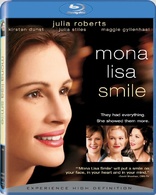Mona Lisa Smile Blu-ray Movie
HomeMona Lisa Smile Blu-ray Movie 
Sony Pictures | 2003 | 119 min | Rated PG-13 | Feb 02, 2010Movie rating
6.2 | / 10 |
Blu-ray rating
| Users | 0.0 | |
| Reviewer | 3.0 | |
| Overall | 3.0 |
Overview
Mona Lisa Smile (2003)
In 1953, a time when women's roles were rigidly defined, free-spirited, novice art history professor Katherine Ann Watson (Julia Roberts) begins teaching at the prestigious all-female Wellesley College--which despite its academic reputation, is an environment where success is measured by 'how well' the students marry. Encouraging these women to strive for a more enlightened future, Watson challenges the administration and inspires her students to look beyond the image of what is, and consider the possibilities of what could be--contrary to popular belief.
Starring: Julia Roberts, Kirsten Dunst, Julia Stiles, Maggie Gyllenhaal, Juliet StevensonDirector: Mike Newell
| Romance | Uncertain |
| Comedy | Uncertain |
| Drama | Uncertain |
Specifications
Video
Video codec: MPEG-4 AVC
Video resolution: 1080p
Aspect ratio: 1.85:1
Original aspect ratio: 1.85:1
Audio
English: Dolby TrueHD 5.1 (48kHz, 16-bit)
Portuguese: Dolby TrueHD 5.1
French: Dolby TrueHD 5.1 (48kHz, 16-bit)
Spanish: Dolby Digital 5.1 (640 kbps)
Thai: Dolby Digital 5.1 (640 kbps)
Subtitles
English, English SDH, French, Portuguese, Spanish, Arabic, Cantonese, Dutch, Indonesian, Korean, Mandarin (Simplified), Mandarin (Traditional), Thai
Discs
50GB Blu-ray Disc
Single disc (1 BD)
BD-Live
Playback
Region A, B (C untested)
Review
Rating summary
| Movie | 3.5 | |
| Video | 3.0 | |
| Audio | 3.5 | |
| Extras | 1.5 | |
| Overall | 3.0 |
Mona Lisa Smile Blu-ray Movie Review
Smile! Mona Lisa's on Blu-ray.
Reviewed by Martin Liebman April 16, 2010What is art?
Perhaps a bit historically lost beneath the shadow of segregation and the monumental Civil Rights
movement of the 1960s was the role of women in the United States in the mid-1900s. Though
not victims of outright unjust radical or gender segregation, women nevertheless found
themselves as part of a
culture that defined for them their roles in the home and place in society as a whole. Their
schooling often preparing them not for a place in the workforce but rather instructing them in
the art of womanhood and the proper role of a "good wife" to the bread-winning husband,
women's education -- even at the university level -- focused as much on domestic behavior,
womanly attitudes, proper posture, and subservience to the man of the house as it did reading,
writing, and arithmetic. A woman's responsibility was not to herself but rather to her
carefully-planned familial structure and the proper care and nurture of her husband, children, and
home.
2003's Mona Lisa Smile, a picture that examines the role of college-aged women in
1953, pits a left-coast progressive Art History professor against her class of traditionally-reared
female students at Massachusetts' Wellesley College and focuses on the resultant clash of ideas
that ultimately threaten to tear apart the fabric of the traditional values espoused and
treasured on campus by both students and faculty alike.
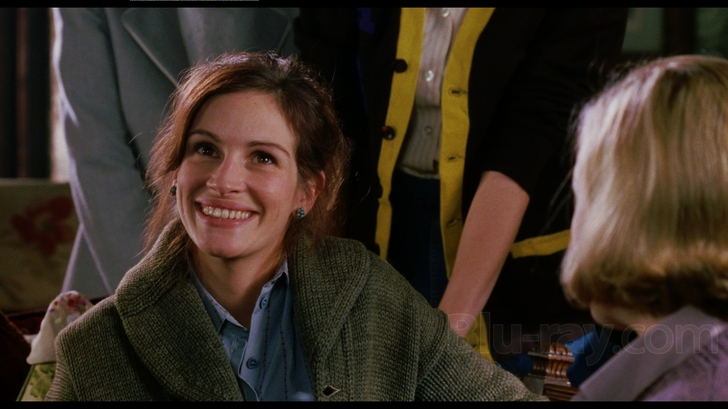
I dream of Richard Gere.
Pacific coast-based Art History professor Katherine Watson (Julia Roberts, Flatliners) has been hired at Wellesley College, a traditional all-women's school in Massachusetts that emphasizes a classical education and proper etiquette for its young ladies, grooming them to marry a good man and settle down into the role of a submissive housewife. When she learns that her students aren't learning anything about art but are instead simply regurgitating the information found in their textbooks, Watson quickly abandons the school-approved curriculum in favor of a more aggressive approach, teaching them to more fully appreciate art -- including modern works that seemingly lack educational, cultural, or artistic merit -- and by extension, she hopes, learn that life need not be dictated to them by what she sees as an outdated system that holds back good minds from achieving all they're capable of. Watson's approach and thought processes causes quite the commotion on campus, a problem that's magnified by top student Betty Warren (Kirsten Dunst, Spider-Man 3) who refuses to let go of the traditional values on which she was raised, beginning a crusade against Watson and engaging in a tit-for-tat running confrontation with her professor when she gets married and therefore expects Watson to ignore her absence from class and exams. Will Watson find favor with some on campus, or will she and her radically-progressive viewpoints be run out of town?
Mona Lisa Smile proves an endearing period piece that manages to examine with some force and purpose the deeply-rooted societal structure of 1950s America, but at the same time create something of a lighter atmosphere that allows the viewer to enjoy the picture -- its look, performances, and themes -- without feeling overwhelmed or under assault by the message that's built throughout the movie. Indeed, there's an air of fluffiness to the movie that gives it that feel-good vibe but without sacrificing the integrity of what it is the picture stands for and all that it tries to convey through its dramatic elements that do prove heavy and thought provoking, even when viewed through the context of a modern-day society where the woman's role is no longer so rigidly defined. Arguably, the film would have worked better were its message as relevant today as it would have been in 1953; that's not to downplay concerns women still had in 2003 or, now, in 2010, as to their place in society and acceptance in it in a role beyond the home, but no doubt much progress has been made since the days of schooling girls in the art of home economics and proper spousal etiquette for the purpose of preparing them for a marriage that was even then structured as much around convenience and stature as it was genuine love and respect.
Ultimately, Mona Lisa Smile is an academia-set film that's about the lessons of life rather than the lessons of a textbook. It's a film that examines the purpose and relevance of an education that goes beyond the strict structure of some academic guideline and that instead spills into real-life scenarios and insights that provide not necessarily answers, but certainly options and various perspectives that allow for the mind to grow and expand beyond the basic -- but certainly important -- facts and figures. Mona Lisa Smile is a picture about how one woman's philosophy gradually shapes the minds she instructs; while they demonstrate proficiency in rote memorization and impeccable understanding of the paint-by-numbers textbook offerings, Katherine Watson instead attempts to instill in them the confidence to branch out beyond what others have laid before them and experience the world through their own eyes and with their own emotions, likes, dislikes, ideas, and perspectives. Watson fights not necessarily to change her students' viewpoints, but to ensure that her voice is heard, understood, and accepted as a legitimate alternative that might not be for everyone but that is at least as worthy, purposeful, and valid as the more traditional viewpoints that challenge her day in and day out.
Aside from its strongly-realized thematic elements, Mona Lisa Smile proves a charming picture thanks to another infectious performance from Julia Roberts and a good supporting cast of younger female leads that manage to wonderfully capture both a 1950s "every girl" style while gradually coming to either accept or understand what it is Roberts' character stands for. Roberts handles the material delicately, never coming across as excessively forceful or demanding that her way be recognized as anything more than an alternative viewpoint, even when those around her demand that she refrain from injecting her personal opinions into her lesson plans. Roberts, always with her trademark smile and breezy, almost whimsically magical persona, lights up the screen here as she does in most every part she plays, showing a strong grasp of the material and demonstrating just the right level of emotion that ultimately helps in solidifying the picture's untraditional but certainly real and commendable finale. Her supporting cast, too, all do well, particularly Kirsten Dunst in a challenging role as a student caught up in the traditional ways but learning that life in the real world isn't always the same as the cheery and perfect existence that's taught in the home and in the classroom. Mona Lisa Smile also boasts strong production design and costuming, resulting in a convincing period feel that not only helps to sell the picture's drama and message, but create a nicely-done throwback atmosphere that's simply a pleasure to look at even outside the confines of the story.
Mona Lisa Smile Blu-ray Movie, Video Quality 
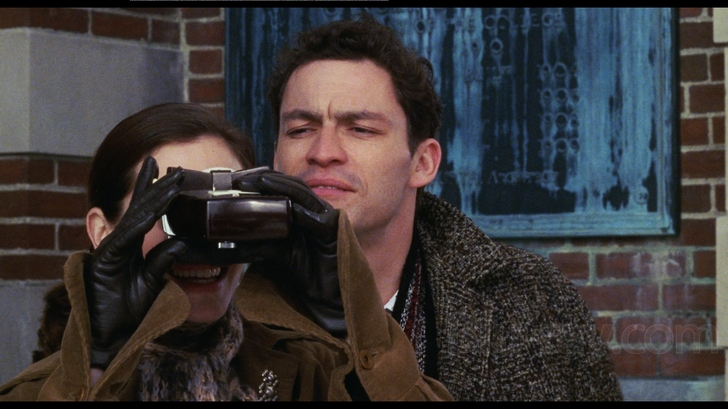
Mona Lisa Smile debuts on Blu-ray with a wishy-washy 1080p, 1.85:1-framed transfer that's of excellent quality in some places but otherwise proves a generally middling effort in most. The picture begins with an almost angelic tone about it, appearing just a bit faded, overly bright, and soft. From there, the picture seems to capture a slight digital sheen that gives the movie a sometimes harsh look about it rather than showcasing a smoother, more natural film-like texture. Still, the image retains a fair amount of grain, but there's a slightly flat feel to the proceedings, too. Black levels appear fairly stable, but flesh tones often showcase a slight red push. Fine detail impresses a great deal in some places, but looks flat and textureless elsewhere. The image does well in its reproduction of heavier period clothing, lending to objects like sweaters an almost palpable and realistic texture. On the flip side, furnishings, walls, and the like -- even those of intricate floral designs -- don't match the same level of realism as clothing and other assorted objects, such as tree trunks, seen throughout. Eagle-eyed viewers may note some very slight aliasing in one shot, and several scenes stand out as noticeably fuzzier than others. A fairly inconsistent but far from disheartening transfer, Mona Lisa Smile never looks bad, rarely looks great, and often finds itself somewhere in the middle where it's certainly several steps up from standard definition material but a far cry from the format's best offerings.
Mona Lisa Smile Blu-ray Movie, Audio Quality 
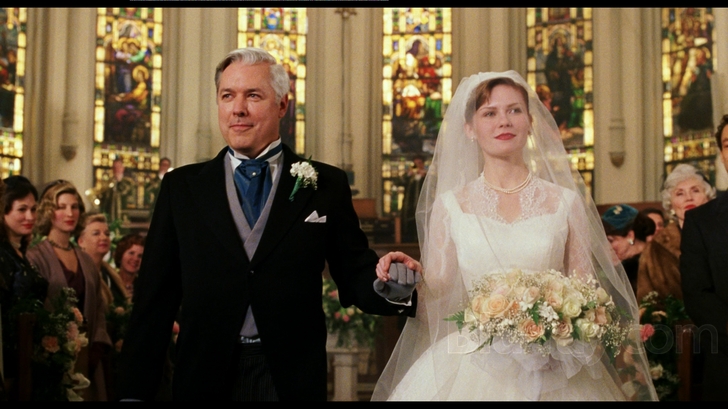
The Dolby TrueHD 5.1 lossless soundtrack that Sony has bestowed upon Mona Lisa Smile is a good one, given the film's reserved sound design. The picture's score is light, its atmospherics subtle, and its dialogue crisp and natural, lending to the experience the expected no-frills, Drama-oriented type of mix that allows for the story to take center stage, helped along mostly by supportive elements in the sound presentation. Musical delivery is smooth and free of any bothersome distortions; it's nicely balanced, centered across the front and with light rear-channel elements in support. The track does contain some fine atmospheric effects; a wedding scene in chapter six features the pre-ceremony music seemingly drifting about the listening area, and combined with the slight background noise of guest chatter, there's an honest, simple sense of immersion into the moment. Such subtle ambience defines much of what the track is about, and even through the lack of powerful bass and extended discrete and directional effects, listeners will appreciate the quiet strength of Mona Lisa Smile's lossless soundtrack.
Mona Lisa Smile Blu-ray Movie, Special Features and Extras 
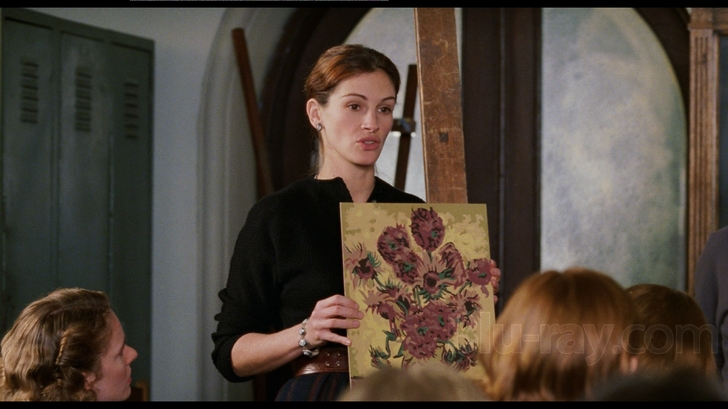
Fans won't be grinning after having a look through Mona Lisa Smile's paltry supplemental package. The extras are highlighted by three featurettes. Art Forum (480p, 6:33) features the cast -- intercut with behind-the-scenes footage -- speaking on what art means to them and their thoughts on some of the high-profile artists and paintings featured in the film. College Then and Now (480p, 14:39) compares and contrasts the role of college in women's lives both in 1953 and in the 21st century through both clips from the film and interview snippets with cast and crew. What Women Wanted: 1953 (480p, 10:43) looks at the transition between women conforming to tradition and moving towards greater independence in post-World War II America. Also to be found on the disc is the music video "The Heart of Every Girl" by Elton John (480p, 3:56), BD-Live functionality, and 1080p trailers for Made of Honor and This Christmas.
Mona Lisa Smile Blu-ray Movie, Overall Score and Recommendation 
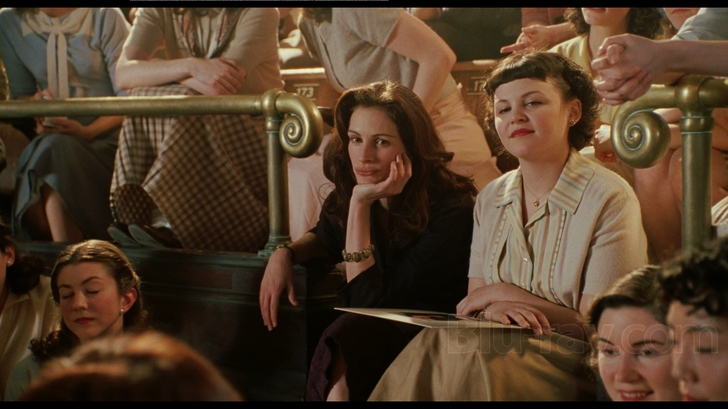
Mona Lisa Smile is a film about life and its structure, the picture examining 1950s tradition and the role of women in society in that era but also proving relevant for other times, places, and ideas, too. Through the broader context of the movie, one can conceivably find meaning in the potential positives of an open mind that looks beyond the boundaries of the strict guidelines and conventions that govern any part of one's life, whatever those boundaries and guidelines may be. What Mona Lisa Smile does so well, though, is to demonstrate the challenges of standing up to tradition and the positives of accepting a new outlook on life without a forceful, spoon-fed approach that demands of its in-film characters and in-theater audiences to toss aside all that they believe in favor of something different. In Mona Lisa Smile, it's all right for the characters to dismiss the message, so long as they accept it as a valid idea. With strong performances and a nicely-realized period look, Mona Lisa Smile is a winner. Sony's Blu-ray release, however, could stand to be a bit better. The picture quality is decent but somewhat lacking, the audio track is of a quality that's reflective of the minimalist sound design, and the supplements are too few in number. Fans can still purchasing knowing that this is currently the best home video presentation of the film on the market, but others might want to rent until the disc sees a good-sized price drop.
Similar titles
Similar titles you might also like

He's Just Not That Into You
2009

Bridget Jones's Diary
2001

Must Love Dogs
Warner Archive Collection
2005

No Reservations
2007

Say Anything...
20th Anniversary Edition
1989

Definitely, Maybe
2008

The Devil Wears Prada
10th Anniversary Edition
2006

In Good Company
2004

Sleepless in Seattle
25th Anniversary Edition
1993

Admission
2013

Ally McBeal: Complete Series

Made of Honor
2008

Julie & Julia
2009

Waitress
2007

Crazy, Stupid, Love.
2011

Practical Magic
1998

The Sisterhood of the Traveling Pants 2
2008

The Wedding Planner
2001

How to Lose a Guy in 10 Days
Deluxe Edition
2003

Under the Tuscan Sun
2003
